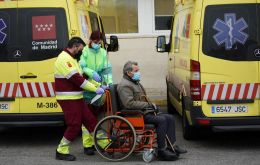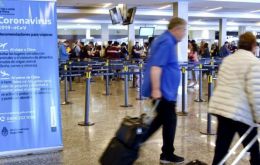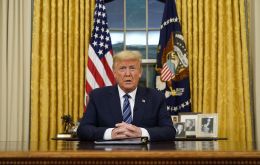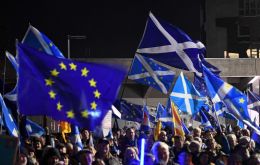MercoPress. South Atlantic News Agency
Tag: Europe
-
Tuesday, March 31st 2020 - 09:20 UTC
Spain overtakes China in Coronavirus infections; business leaders warn of impact on jobs with the lockdown

Spain overtook China in the number of those infected with coronavirus on Monday as the government tightened restrictions on a population entering its third week under one of the strictest lockdowns in Europe.
-
Monday, March 30th 2020 - 08:50 UTC
Cleaner air in European cities as nitrogen dioxide levels drop with lockdowns

Air pollution has decreased in urban areas across Europe during lockdowns to combat the corona-virus, new satellite images showed on Monday, but campaigners warned city-dwellers were still more vulnerable to the epidemic. Cities including Brussels, Paris, Madrid, Milan and Frankfurt showed a reduction in average levels of noxious nitrogen dioxide over Mar 5-25, compared with the same period last year, according to the Sentinel-5 satellite images.
-
Monday, March 30th 2020 - 07:36 UTC
Pandemic: Sweden avoids draconian measures of the rest of European countries

While swathes of Europe's population endure lockdown conditions in the face of the coronavirus outbreak, one country stands almost alone in allowing life to go on much closer to normal. After a long winter, it's just become warm enough to sit outside in the Swedish capital and people are making the most of it.
-
Saturday, March 28th 2020 - 08:54 UTC
A bright sight from coronavirus: industry and transport emissions in three EU cities down 40%

Air pollution from nitrogen dioxide has fallen by an estimated 40% in three European cities, according to new satellite data released by the European Space Agency (ESA), coinciding with a widespread lockdown to curb the spread of the coronavirus.
-
Friday, March 27th 2020 - 09:01 UTC
Nothing to celebrate on the 25th anniversary of the EU open border Schengen agreement

The European Union marked the 25th anniversary of its open-border Schengen agreement on Thursday with all its land borders shut or subject to heavy checks imposed in an effort to curb the spread of the coronavirus.
-
Friday, March 13th 2020 - 08:54 UTC
Latin American countries halt flights from Europe, ban public gatherings and close schools

Several Latin American countries stepped up measures on Thursday to slow the spread of the coronavirus, halting flights to and from Europe, banning public gatherings and closing schools.
-
Thursday, March 12th 2020 - 08:55 UTC
Coronavirus: Trump locks out all travel from Europe for 30 days and pledges financial relief to small businesses

President Donald Trump on Wednesday said the U.S. would restrict all travel from Europe for the next 30 days and use executive orders to offer financial relief to individuals and small businesses in his most extensive steps to date to address the crisis of the coronavirus.
-
Monday, February 3rd 2020 - 07:58 UTC
UK and EU begin this Monday post-Brexit negotiations

Britain on Sunday began to detail a hard-line stance in upcoming negotiations with the European Union on future relations, following its historic departure from the bloc. Foreign Secretary Dominic Raab, who will embark on a tour of Asia and Australia this week as he looks to pave the way for global trade deals, warned that London will not accept alignment with EU rules.
-
Saturday, February 1st 2020 - 08:55 UTC
Cheers and tears as UK ends 47 years of European Union membership

Britain on Friday ended almost half a century of European Union membership, making a historic exit after years of bitter arguments to chart its own uncertain path in the world. There were celebrations and tears across the country as the EU's often reluctant member became the first to leave an organization set up to forge unity among nations after the horrors of World War II.
-
Saturday, February 1st 2020 - 08:31 UTC
Scotland votes for independence referendum; EU flag will remain flying outside Holyrood

Scotland’s Parliament voted this week ahead of Friday, to hold a new referendum on Scottish independence, a move intended to increase political pressure on the British government as the UK leaves the European Union.
